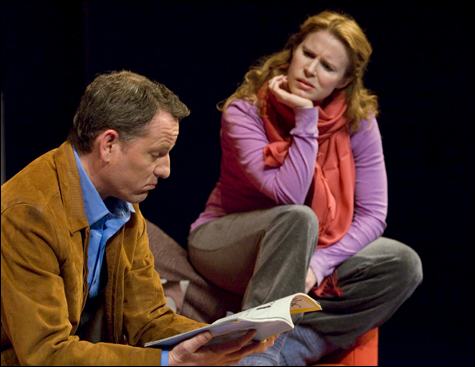
LET THE SPINNING NEEDLE SPIN: Magnetic North.
|
|
Magnetic North
by William Donnelly | Directed by Richard Hamburger | Produced by Portland Stage Company, 25A Forest Avenue, Portland | through April 20 | 207.774.0465
|
“Well, this has to be inappropriate,” says Mara (Danielle Skraastad), hastily moving away from a rather close moment with old flame James (Tom Butler). He’s now married to Leigh (Jessica Dickey), who’s mourning a recent miscarriage. Still, “Is it?” James asks Mara. And he isn’t being coy. He’s genuinely unsure about the dimensions and bounds of emotional fidelity, and the point at which betrayal actually occurs. Neither James nor anyone else will find many absolute measurements in Magnetic North, by William Donnelly. The 2005-6 Clauder Competition-winning play is on stage now at Portland Stage Company, under the direction of Richard Hamburger, a former artistic director of PSC.
James, during a difficult moment in his married life, has run across Mara’s e-mail address, and the two get together for an innocent catch-up. Mara is still single, free-spirited, and provocative, and over the course of a few glasses of wine, sexual sparks fly. Although nothing physical happens between them, James is guilt-ridden enough to return home and tell Leigh about the “animal feeling” he has experienced with Mara. When Leigh doesn’t take this too well, James goes off to drink and consult with his deliciously crude co-worker Emmett (the wonderful Quincy Dunn-Baker), whose analysis of the situation is, basically, “What the fuck were you thinking?”
There follows an exploration of “truth” and “trueness,” as the four characters position and re-constellate themselves, feeling out their bearings on the subject. Donnelly’s central metaphor juxtaposes “magnetic north” (a constantly shifting point based on geo-magnetic fields) with “true north” (a fixed physical location at the North Pole), and the play’s staging heightens this conceit nicely. The excellent Anita Stewart has designed a rotating set of nearly seamless, depth-less blue (which shifts in hue and mood via Bryon Winn’s lovely light design), which covers walls, floor, and ceiling. It revolves between three minimally set locations — James and Leigh’s living room, the bar, and the office — all of which remain on stage throughout the show. The design suggests that all the characters’ circling and shifting takes places in a sky, sea, or internal place bewilderingly bare of cairns or a consistent sense of direction.
The characters who navigate this place are at once glib and urgently sincere. Donnelly infuses plenty of badinage into their verbal negotiations, and these actors play the comedy vigorously, for the desperate relief from gravity that it is for their characters. Butler modulates his use of humor well between Skraastad and Dickey: the joking around between James and Leigh holds both a familiarity and a clear underlying hurt, while the repartee of James and Mara is tauter, even jumpy, with the unknown and the forbidden.
Where the comedy breaks into candor, the performances are more demanding, and Butler makes fine, understated work of the insecurities that have taken James to this point. As his agonizing wife, Dickey holds her pain much closer to the surface, and is excruciatingly convincing, particularly as we see Leigh reeling between overwrought jealousy and an acute, mortified self-awareness. The dynamics between her and James are fraught with these layers of knowing themselves and each other.
Between James and Leigh’s foil Mara, it’s the unknown that keeps things gripping, and the two of them have a rapport that’s avid, witty, and well-paced, though their attraction more often has the flavor of comedy than that more visceral thing beneath the banter.
As James and Mara position themselves closer and closer to a breach, symmetry demands that Emmett, heretofore a crude and irritating but very astute outside arbiter, come closer to Leigh. And this is where I’d like to give special props to Dunn-Baker for his enormously entertaining and extraordinarily sensitive performance of James’s outrageous, fast-talking, co-worker. Emmett is the character with the greatest and most difficult arc to navigate, as his role shifts from obnoxious outsider to tender and empathetic catalyst, and Dunn-Baker’s work is lovely — subtle and affecting, and still funny.
It’s Emmett who has some of the wisest lines in the play. The philosophy he offers, amid all his adolescent humor, is a system of degrees — degrees of guilt, degrees of sharing, degrees of truth. It’s around these that the characters of Magnetic North must navigate. There are, he says, no absolutes.
Megan Grumbling can be reached at
mgrumbling@hotmail.com
.